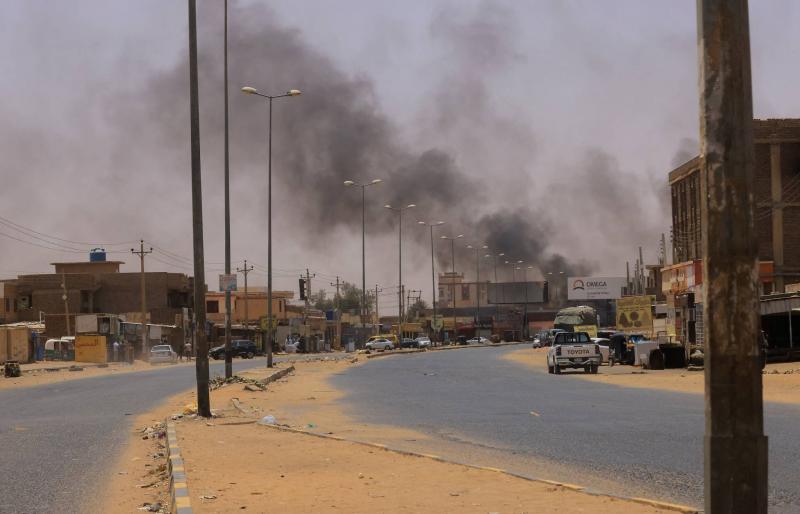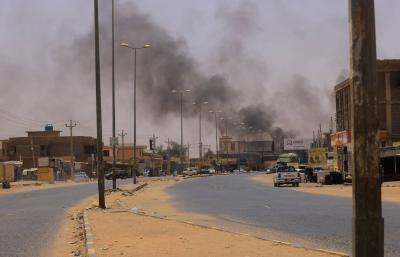Eid, in whatever form it arrives in Sudan, finds mourning mothers bidding farewell to their beloved children while fathers muster courage, for it is forbidden for men to cry. The two escalating conflict parties, namely the army and the "Rapid Support Forces," have been preoccupied in the streets over the last seven days defining two "strategic" terms: “control” or “withdrawal.” In either outcome, the essentials like cotton, gauze, medical supplies, drinking water, food, and safety are all among the losses faced by a populace awakening to war but yet to comprehend the reality of their situation. As Eid laments in agony, cheers of victory rise among soldiers and fighters, a victory that translates into nothing but a major loss for Sudanese who have seen their conditions degrade to nothingness.
On Eid morning, explosions and artillery bombardments shook the Sudanese capital, Khartoum, despite news of a proposed ceasefire welcomed by both conflict parties during Eid al-Fitr. The International Organization for Migration reported today the death of one of its staff members, who was caught in crossfire while traveling with his family near the town of Al-Obeid, southwest of Khartoum, when he was shot to death. The organization’s Secretary-General, Antonio Vitorino, expressed deep sorrow over the death of their colleague and shared condolences with his wife and newborn son, as well as the team in Sudan. The deceased was Sudanese, marking the fourth UN staff member to die in Sudan since the outbreak of fighting. The Sudanese army, in a statement, claimed they have "moved beyond the phase of resilience and challenge and have begun the gradual cleaning of rebel strongholds around the capital,” noting that “the daily life of our citizens is very difficult due to the current circumstances, but we share these difficulties together in our quest to rid the country of the worst military manifestation in Sudan’s history.”
### Critical Health Situation
Sudan’s Minister of Social Development, Ahmed Adam Bakhit, announced that "the health situation is critical due to the ongoing clashes between the army and the Rapid Support Forces," noting that "we have made an appeal to charitable organizations to provide aid to those affected by the fighting. Many goods have run out in stores due to supply shortages."
### Rising Death Toll
The World Health Organization revealed today that 413 people have been killed in Sudan, with 3,551 injured since the outbreak of intense fighting six days ago. WHO spokesperson Margaret Harris stated, "The organization has recorded 11 attacks on health facilities in Sudan so far, and we urge a halt to such attacks." UNICEF spokesperson James Elder reported that at least nine children have been killed in the fighting, and more than 50 wounded, warning that "the fighting puts the lives of Sudanese children at risk who are already suffering from malnutrition." Elder also highlighted that "Sudan already has one of the highest rates of child malnutrition in the world. Now essential care services for approximately 50,000 children suffering from severe malnutrition have stopped, which threatens their lives."
The WHO called on both parties to open a humanitarian corridor for health workers, patients, and ambulances. The Central Committee of Sudanese Doctors reported that multiple areas in Khartoum are still experiencing bombardments and exchanges of fire between army and Rapid Support Forces, resulting in destruction of buildings, facilities, and public properties. They also mentioned that "55 hospitals have ceased operations due to clashes between the army and the Rapid Support Forces, along with 13 hospitals being bombed and 19 hospitals evacuated forcefully."
### Responses from Various Nations
The Lebanese Foreign Ministry issued a statement indicating that "in the context of ongoing consultations regarding the situation of Lebanese nationals in Sudan, coordination is taking place with the Lebanese embassies in Khartoum and Cairo and the Higher Relief Commission to enumerate all Lebanese wishing to leave Sudan, once suitable security and logistical conditions allow.” Spanish Foreign Minister José Manuel Albares noted that "Spanish military aircraft are on standby to evacuate around 60 Spanish citizens and about 20 civilians from other countries from the capital, Khartoum." He stated, "As the intensity of fighting increases every day, it has not been possible to organize an evacuation."
For Germany, Foreign Minister Annalena Baerbock emphasized that "the top priority in Sudan is a ceasefire during Eid to enable the evacuation of people." U.S. Secretary of State Antony Blinken announced discussions with Sudan's Army Chief General Abdel Fattah al-Burhan and the commander of the Rapid Support Forces, Mohamed Hamdan Dagalo, expressing welcome for a proposed three-day ceasefire.
The southwest of Khartoum continues to struggle amid ongoing violence while international calls for a ceasefire and the protection of civilians resonate. The Sudanese military announced its agreement to a 72-hour humanitarian ceasefire beginning Friday morning, stating hopes that rebels would adhere to ceasefire requirements. Simultaneously, the Rapid Support Forces confirmed their acceptance of such a truce.




